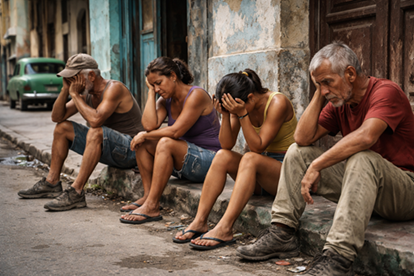I sit on my verandah, it is about 10:00 am, a gentle cool breeze wafting, and I gaze at the sea — prussian blue, ultramarine and turquoise, studded here and there with diamonds. A ray jumps, it must be a spotted eagle, mantas have not been in the bay for a while, “BANG!” as it lands. A greater frigate bird with black prehistoric zig zag shape patrols, on the lookout for anything he can steal, because if he dives into the sea for his food he drowns, no oily waterproofing on his feathers at all.
A fisherman rows past. I idly wonder if he has any channel crabs, but he doesn’t stop, intent on his own plan. A flittering of baitfish shatters the surface. A yellow kayak passes, paddlers hard at work under the hot sun. The pilot boat exits the harbour mouth, there must be a bauxite ship about to come in, the dock, a mile away is empty. The bird feeding tree is filled with tiny white blossoms and the divine, elusive fragrance comes and goes. A mango hummingbird, my favourite, on fire in the sun, darts down to the humming bird trumpet and darts away again.
This is the idyll of Discovery Bay. So many memories; a mongoose in the drawing room, on his hind legs, watching the television, he sees me move, leaps out the door but it is half shut and he recoils off the glass, regroups and dashes out the open side — later he is seen asleep under a chaise.
An enormous black crab caught by the children in our rocks, cuts in two a huge wooden server spoon with his claw. Children and neighbours galore, always a feast, always fun. No one ever came to dinner without bringing an unasked-for offering, perhaps a delectable dessert. Scaring Auntie Pat by making eerie noises at her window… she got her revenge by draping a sheet over herself, the little ones really thought she was a ghost. One of the children’s friends dives into a rock, stiches and a roll of gauze tacked on, forever after known as “tampon-head”. Alfred, present from just after the house was bought until his death 33 years later, a lay preacher and the epitome of kind and loving human nature, very fondly and often, remembered.
It is all under threat. The scientists all agree that the installation of the captive dolphins will mark the beginning of the end for Discovery Bay. When sea grass dies, when coral dies, when fish leave, what will be left? I do not know, but we do need to know. We need to begin to realise what our human actions do to the surroundings that we treasure.
We need people whose economic choices are limited, to understand what farm clearings do to hillsides, what burning off cover does to the soil, what polluting streams means, and we need for them to have alternatives that meet their needs without degradation of what they also love. We need to understand what storm surges do when not slowed and diminished by live reefs and mangroves. Especially with rising sea levels.
We need to educate, enact and enforce. We need to be serious about this. We need developers who understand what impact their plans will have and therefore approach their projects responsibly. We need hotels to consider parking, staff housing and welfare, sewage treatment, disposal of solid waste, abandonment of non-essential plastics. I myself am guilty. I put two cess pits at Sea Haven, one drains to the other and I hoped the circuitous route would cleanse. I had a gentleman go there week before last and am awaiting his quotation for a sewage treatment plant; I know I will be a target because of my part in this whole Discovery Bay fiasco. I also know I should have done this years ago but the cost is so very high. The cost of responsibility is always high, in monetary terms and in effort, sometimes in inconvenience, but in our world today, with so many people, so many divergent needs, so much pressure, we need to have a road to travel on where people help, where flagrant transgressions are punished, where game wardens are paid and therefore exist, on land and at sea, where communities pull together and take on myriad roles. Where shining examples are recognized and rewarded.
Tom Goreau wrote me this morning and I quote: I have been studying the changes in the algae of Discovery Bay all my life, and since I last dived there around 10 years ago there has been a clear improvement in water quality reflected by changes in the algae. This is extraordinary: I hadn’t expected this after watching deterioration for so long, and it should be documented! Captive dolphins would undo the progress that has been made in sewage treatment in Discovery Bay and in coral reef health.
He is the president of Global Coral Reef Alliance, President, Biorock Technology, Coordinator, Soil Carbon Alliance, lectures at Harvard and Cambridge universities and travels the world researching coral reefs. He is the author of several books including Innovative Methods of Marine Ecosystem Restoration. He joins quite a long list of scientists who have expressed their concerns regarding captive dolphins in the bay.
We are asking the Supreme Court to quash the permit for Discovery Bay. We have begun two GoFundMe sites for donations for legal costs. We ask for the support of every proud Jamaican to help us preserve this iconic bay, described by Guardsman Hospitality as the most beautiful bay in Jamaica. It is indeed. For now.
We want our children and our children’s children to enjoy these places. We want them to hike the Blue Mountains and see tree ferns and hear solitaires. We want them, if they wish, to explore those areas still holding small populations of yellow snakes, iguanas and coneys. To see and enjoy beaches that are not ruined and eroded, to see our green hills in our land of wood and water. To hold all our people in respect and hold them accountable.
We need to start here and now with Discovery Bay.



